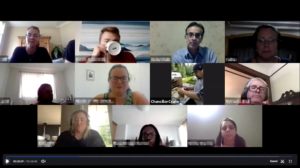Teach For Canada switches program delivery in light of pandemic to bring important Indigenous information to teachers

By Rick Garrick
THUNDER BAY — Teach For Canada has switched the annual Summer Enrichment Program it usually holds for teachers at Lakehead University to an online virtual format due to the coronavirus disease 2019 (COVID-19) pandemic. About 51 fully qualified accredited teachers from across Canada have joined the program to learn from Indigenous leaders, northern teachers and education experts from July 12-24.
“Teach For Canada’s primary job is to recruit teachers who would like to teach in the north and interview them and make sure they would be a good fit for the north,” says Cynthia Wesley-Esquimaux, chair on Truth and Reconciliation at Lakehead University, a board member with Teach For Canada and Chippewas of Georgina Island First Nation citizen, adding that there is about an 83 per cent retention rate for Teach For Canada teachers. “They make a two-year commitment and some of them have stayed beyond that. We’re not just recruiting teachers and saying, ‘Good luck!’ We’re saying, ‘We’re going to prepare you, we’re going to give you language, we’re going to give you historical information, we’re going to teach you about residential schools, we’re going to teach you about being trauma-informed.’”
Teach For Canada braids tradition, history and pedagogy with technology to prepare the teachers for their roles in First Nation schools across northern Ontario and Manitoba.
“We’re holding sessions this year called Sharing Our Gifts, and we asked community members to share any kind of lessons or teachings or knowledge with the [teachers] that they could take north with them,” says Shardae Fortier, director of community engagement and Indigenous relations at Teach For Canada and Red Rock Indian Band citizen. “We’re doing an hour each day for two weeks. We held one yesterday (July 13) and I think it was a great success — it was (delivered by) Narcisse Kakegabon, a citizen of Long Lake #58 who has taught in Pikangikum since 2018.”
Fortier says the Sharing Our Gifts sessions include teachings on treaties and First Nation politics as well as filleting fish and preparing fish for smoking.
“Someone will be discussing traditional medicines as well as producing salves and steeping tea,” Fortier says. “Someone will be discussing Pow Wows and how they’ve created Pow Wows in their school.”
Cecelia Person, Native language teacher with the Thunder Bay Catholic District School Board and Red Rock Indian Band citizen, is scheduled to deliver her Native language sessions beginning July 20 through the Zoom platform.
“I’ll be teaching basic introductory [Anishinaabemowin] to the teachers, just some words and phrases they might find useful while [in the communities],” Person says. “Last year went really well — it was new to me last year because I had never taught adults before. They were very receptive to my teaching style and the way I delivered my lessons.”
Sara-Christine Gemson, vice president of programs at Teach For Canada, says the online format allows Teach For Canada to involve more representatives from the communities in the program.
“This has given the teachers the opportunity to learn directly from a greater number of community members,” Gemson says. “Another silver lining is it’s allowed us to open up some of the sessions to non-Teach For Canada teachers, so we’ve extended the invitation to teachers also working in northern First Nations but in other provinces or in other First Nations in northern Ontario, including other teachers in the community partners we work with.”
Teach For Canada expects to have more than 100 of its prepared teachers, including this year’s cohort, hired by First Nation communities for this upcoming school year.


